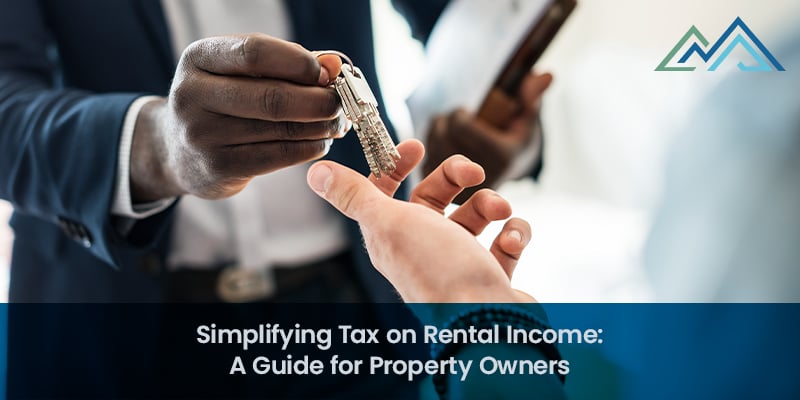Buying an investment property to rent is useful in a variety of ways. It can help you diversify your investment portfolio by adding real estate, which provides a regular income and can serve as a hedge against inflation. Rental income can add up quickly, especially if you’re in the position to buy and hold multiple properties in a thriving rental market.
At CMP, many of our clients own real estate; one of their biggest concerns is taxation. They want to know how much they will owe in federal income taxes and what they can do to simplify their taxes and avoid overpaying. We have created this guide to help you understand how taxation on rental income works.

Do You Pay Taxes on Rental Income?
The Internal Revenue Service requires that all rental income you receive must be reported and will be taxed. The IRS classifies rental income as ordinary income, which means it must be reported on your tax return and taxes must be paid accordingly.
At the federal level, taxes are broken down into brackets. Tax rates build from the bottom up, so if you move into a higher tax bracket due to rental income, you’ll pay a higher tax rate on the amount of income that falls into that bracket.
The good news is that there are many ways to offset some of your tax liability as it relates to rental income, including the option to deduct expenses related to your rental properties.
Understanding the Concept of Rental Income
All rental income must be reported as part of your gross income, but it’s important to understand what the IRS considers to be rental income. You’ll need to include the following:
- All amounts you receive for the use or occupation of property you own.
- Advance rent (rent you receive before the period covered by the payment.)
- Security deposits (If you do not keep a security deposit, you are not required to report it, but you must report any amount you retain in the year you retain it.)
- Payments for canceling a lease.
- Expenses paid by a tenant. (For example, if a tenant pays water and sewage expenses that are not part of your leasing agreement.)
For example, if you received payment for the first and last month’s rent, you would need to report all that you received, with the first month being rent and the second being advance rent.
How is Rental Income Taxed?
Rental income is taxed at the same rate and in the same way as ordinary income. You must report it to the IRS as income and pay taxes accordingly. If you earn enough rental income to push you into a higher tax bracket, your tax percentage for some of your rental income will increase.
One big advantage of the tax rules around rental income is that rental income is not considered earned income. If you are self-employed, you must pay the self-employment tax of 15.3% on all earned income. This tax is a combination of the employer’s and employee’s portion of the Social Security tax and the Medicare tax. You are not required to pay that tax on rental income.
What is the Tax Rate on Rental Income?
The tax rate on rental income depends upon which tax bracket you fall into. Here are the tax brackets for 2023 for single filers:
- 10% for income up to $11,000
- 12% for income between $11,001 and $44,725
- 22% for income between $44726 and $95,375
- 24% for income between $95,376 and $182,100
- 32% for income between $182,101 and 231,250
- 35% for income between $231,251 and $578,125
- 37% for income of $578,126 or more
Keep in mind that the United States uses a progressive tax system, so even if you are in the highest income tax bracket you won’t pay the highest rate on all of your income. For example, you would pay 37% only on your ordinary income over $578,126.
You will also need to keep in mind the tax laws, rates, and regulations in the state where you live. While a few states have no income tax, most do. If you live in a state that has an income tax, you will also be required to report your rental income and pay taxes on the state level.
How to Report Rental Income on Taxes
When you file your federal tax return, you must report all rental income, whether it comes from renting a room, an apartment, or an entire building, on Form 1040 or Form 1040-SR, Schedule E, Part I. On the form, there is space to list your total income for the property you own, your expenses related to the property, and the depreciation of the property. You can see the Instructions for Form 4562 to calculate depreciation to enter on Schedule E, Line 18.
Schedule E has enough space for up to three rental properties. If you own more than three rental properties, you should complete as many Schedules E as necessary to list every rental property. Using this method, put only two properties on each Schedule E except the last one, and use the third line on that one to total your rental income. In other words, the figure in the Totals column on that one should equal the combined total of all Schedules E.
You should refer to your state taxing authority for instructions on how to report rental income when you file your state income tax return.
Ways to Reduce Taxes on Rental Income
There are many ways to reduce the taxes you pay on rental income. We recommend working with a tax professional to be sure you take advantage of every available deduction and don’t pay more than you need to.
Here are some of the most common tax deductions on rental properties to be aware of before you report your rental income and pay taxes on it.
Depreciation
Anybody who owns rental property, whether it is a residential property or commercial property, has the option to take a tax deduction for depreciation. Depreciation is spread out over the lifetime of the property. Per IRS rules, the lifetime is 27.5 years for any residential property and 39 years for commercial property.
As an example, you might purchase a commercial property for $1,000,000. You would divide the amount you paid by 39 years for an annual depreciation deduction of $25,641.03. It’s important to note that there will be a tax impact when you sell the property because, at that point, you will be required to pay the standard income tax rate on any depreciation you have claimed. This is known as the depreciation recapture tax.
Mortgage Interest
When you buy a personal residence, there is a limit on how much of your mortgage interest you can deduct. That’s not the case with rental properties. You can deduct as much interest as you pay, but you must report it as a business expense.
To report your mortgage interest and claim this deduction, you will need Form 1098, which you should receive from your mortgage lender(s).
Property Tax/Property Insurance
Another difference between rental properties and your primary residence is how you claim deductions for the property taxes you pay. Like mortgage insurance, property taxes must be reported as a business expense and deducted accordingly.
The same is true of any insurance you purchase for your rental properties. You should keep track of the insurance premiums you pay and deduct them as a business expense when you report income for your rental properties.
Property Expenses
There are a host of other deductible expenses that property owners can use to reduce their taxes when they report income from rental properties and file their federal taxes.
- Property maintenance expenses may include anything you do to maintain the value of your property, including paving the parking lot, painting the exterior or interior of apartment buildings, or repairing or replacing a roof.
- Property management expenses may include any time you spend managing the property, whether showing apartments to prospective tenants, dealing with maintenance issues, or paying a property manager or management company to handle routine management tasks on your behalf.
- Advertising expenses may be deductible if you pay to advertise vacant apartments and attract new tenants.
It’s important to note that while rental expenses and maintenance are deductible, the cost of improvements may not be tax deductible since these increase the value of your property instead of maintaining it.
Pass-Through Deduction
It’s common for real estate investors to form a Limited Liability Company (LLC) for the purposes of buying and managing real estate investments. If you have an LLC, then you may be able to claim the pass-through deduction (QBI) when you file your taxes.
LLCs are pass-through organizations for taxation, meaning that LLC members pay for money earned when they file their personal income tax returns. You can claim up to a 20% deduction of your real estate investment income if you provide at least 250 hours of rental services per year. This is known as the Qualified Business Income deduction or QBI.
Do You Pay Self-Employment Taxes on Rental Income?
As we have previously noted, one of the benefits of earning rental income is that you do not need to pay self-employment taxes on what you earn.
The IRS considers rental income to be taxable income but not earned income; you pay self-employment taxes only on earned income.
Potential Penalties for Not Properly Reporting Rental Income
It’s essential to report your rental income to the IRS and any state taxing agency to avoid penalties. There are two penalties to be aware of on the federal level.
- 20% of any understated amount.
- Up to 75% penalty for civil fraud if information about rental income was deliberately withheld.
You may also be liable for late fees. For that reason, you’ll need to be diligent about reporting all rental income and paying any appropriate taxes on time.
Tax Reforms Related to Rental Income
The tax code changes frequently. Here are a few tax reforms to be aware of that may affect the tax you pay on rental income:
- The QBI will remain in effect until 2025 unless Congress renews it.
- The rules around reporting rental income changed in 2022. You are required to report all rental income above $600, which is a decrease from the previous requirement of $20,000. If you use a third party to collect rent, they will send you Form 1099-K, which you will need to attach to your tax return.
- Security deposits are not taxable when you collect them, but they are taxable if a tenant moves out and you keep part or all of the deposit to pay for property damage.
- If you collect the first and last month’s rent from new tenants, you must report everything you collect as rental income.
Working with a professional accountant will ensure that you stay on top of tax reforms and changes that may have an impact on how you pay taxes on your rental income.
Get Help Navigating the Complexities of Rental Income Tax
Understanding the tax implications of rental income can be overwhelming, particularly if you have just started earning rental income. The information in our guide can help you report your rental income, take all allowable deductions, and avoid overpayments and penalties.
Are you in search of help to manage your taxes for rental income? Look no further! CMP is equipped and ready to guide you through this complex process. We provide comprehensive income tax services that cater to various needs, including rental income tax assistance.

















